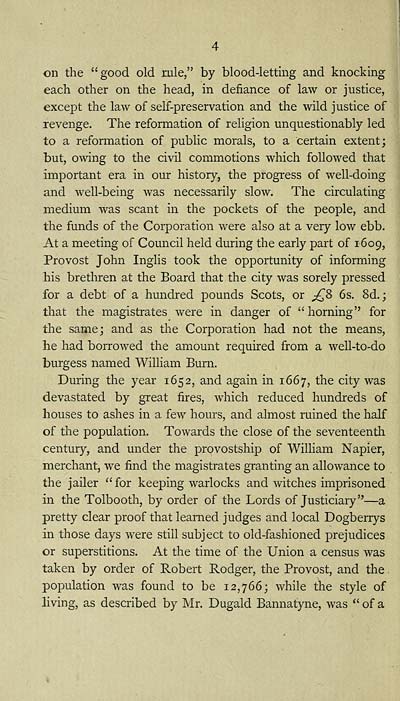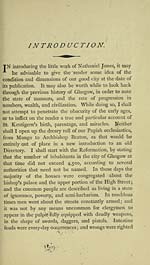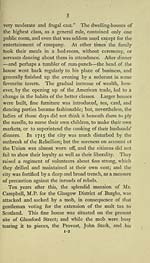Towns > Glasgow > 1787 - Reprint of Jones's directory; or, Useful pocket companion for the year 1787
(12)
Download files
Complete book:
Individual page:
Thumbnail gallery: Grid view | List view

on the "good old rule," by blood-letting and knocking
each other on the head, in defiance of law or justice,
except the law of self-preservation and the wild justice of
revenge. The reformation of religion unquestionably led
to a reformation of public morals, to a certain extent;
but, owing to the civil commotions which followed that
important era in our history, the progress of well-doing
and well-being was necessarily slow. The circulating
medium was scant in the pockets of the people, and
the funds of the Corporation were also at a very low ebb.
At a meeting of Council held during the early part of 1609,
Provost John Inglis took the opportunity of informing
his brethren at the Board that the city was sorely pressed
for a debt of a hundred pounds Scots, or ;£S 6s. 8d. ;
that the magistrates were in danger of "horning" for
the same; and as the Corporation had not the means,
he had borrowed the amount required from a well-to-do
burgess named William Burn.
During the year 1652, and again in 1667, the city was
devastated by great fires, which reduced hundreds of
houses to ashes in a few hours, and almost ruined the half
of the population. Towards the close of the seventeenth
century, and under the provostship of William Napier,
merchant, we find the magistrates granting an allowance to
the jailer " for keeping warlocks and witches imprisoned
in the Tolbooth, by order of the Lords of Justiciary" — a
pretty clear proof that learned judges and local Dogberrys
in those days were still subject to old-fashioned prejudices
or superstitions. At the time of the Union a census was
taken by order of Robert Rodger, the Provost, and the .
population was found to be 12,766; while the style of
living, as described by Mr. Dugald Bannatyne, was " of a
each other on the head, in defiance of law or justice,
except the law of self-preservation and the wild justice of
revenge. The reformation of religion unquestionably led
to a reformation of public morals, to a certain extent;
but, owing to the civil commotions which followed that
important era in our history, the progress of well-doing
and well-being was necessarily slow. The circulating
medium was scant in the pockets of the people, and
the funds of the Corporation were also at a very low ebb.
At a meeting of Council held during the early part of 1609,
Provost John Inglis took the opportunity of informing
his brethren at the Board that the city was sorely pressed
for a debt of a hundred pounds Scots, or ;£S 6s. 8d. ;
that the magistrates were in danger of "horning" for
the same; and as the Corporation had not the means,
he had borrowed the amount required from a well-to-do
burgess named William Burn.
During the year 1652, and again in 1667, the city was
devastated by great fires, which reduced hundreds of
houses to ashes in a few hours, and almost ruined the half
of the population. Towards the close of the seventeenth
century, and under the provostship of William Napier,
merchant, we find the magistrates granting an allowance to
the jailer " for keeping warlocks and witches imprisoned
in the Tolbooth, by order of the Lords of Justiciary" — a
pretty clear proof that learned judges and local Dogberrys
in those days were still subject to old-fashioned prejudices
or superstitions. At the time of the Union a census was
taken by order of Robert Rodger, the Provost, and the .
population was found to be 12,766; while the style of
living, as described by Mr. Dugald Bannatyne, was " of a
Set display mode to: Large image | Transcription
Images and transcriptions on this page, including medium image downloads, may be used under the Creative Commons Attribution 4.0 International Licence unless otherwise stated. ![]()
| Scottish Post Office Directories > Towns > Glasgow > Reprint of Jones's directory; or, Useful pocket companion for the year 1787 > (12) |
|---|
| Permanent URL | https://digital.nls.uk/85271943 |
|---|
| Description | Directories of individual Scottish towns and their suburbs. |
|---|
| Description | Around 700 Scottish directories published annually by the Post Office or private publishers between 1773 and 1911. Most of Scotland covered, with a focus on Edinburgh, Glasgow, Dundee and Aberdeen. Most volumes include a general directory (A-Z by surname), street directory (A-Z by street) and trade directory (A-Z by trade). |
|---|


